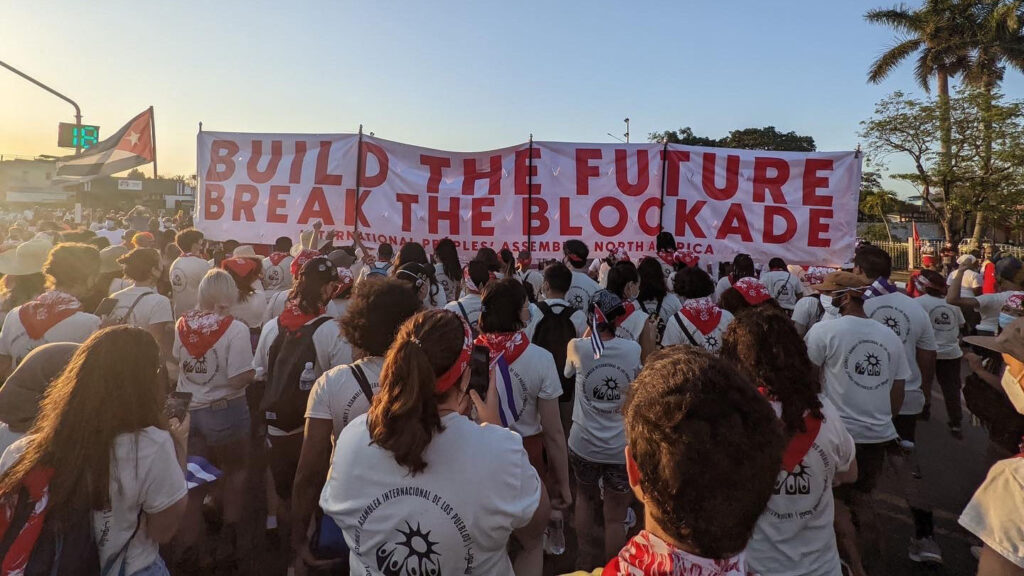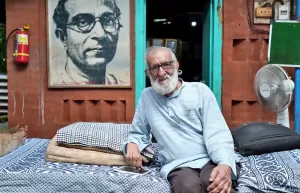[Cuba is an island nation whose 1959 socialist revolution broke the chains of US imperialism, which had plagued the country since the beginning of the 20th century. Since the beginning of the revolution, the US has inflicted a blockade on Cuba, which still stands after more than 60 years. A growing movement of people in the US widely denounce the blockade, with the rallying cry “Let Cuba Live!” Most recently, the Biden administration announced that it would lift some of the harshest blockade restrictions on Cuba, including lifting the $1,000 cap on money sent to family members in Cuba.
Gabriela Silva is a young Brazilian-American organizer and artist based in Queens, NY. As a movement leader, she’s been active in many people’s struggles, like the fight against rezoning and gentrification in New York City, especially as part of the struggle against the proposed Amazon tech headquarters in Queens. She’s also been a part of the movement against the blockade in Cuba and sanctions in Venezuela, and is active in the women’s and LGBTQ movements in the United States.
As a member of the Party for Socialism and Liberation, Silva recently participated in a youth brigade to Cuba, where she spoke in a special session with the Cuban president. Silva reflected on those experiences, and how revolutionary movements in the United States can learn from Cuba, to Peoples Dispatch.]
❈ ❈ ❈
Peoples Dispatch: What was it like speaking in a session with the president of Cuba? What did you speak about?
Gabriela Silva: For context, this gathering was the International Meeting of Solidarity. There were delegations from around the world presenting, and many Cuban leaders presented as well. There were opening statements, then three different sessions: solidarity with the just causes of the people; the world economic crisis, COVID-19 and the right to life; and unity within diversity in the anti-imperialist war of the people.
I was there with a small group from our brigade, the International People’s Assembly Youth Brigade. I decided to go to a session on COVID-19 because for a time New York City, where I live, was the epicenter of the epicenter. Within that, the borough that I live in was among the hardest hit. Queens is a neighborhood with a large immigrant community and many of our neighbors were workers on the front lines. Many of them were not able to self isolate or quarantine, and had to work throughout the pandemic with little to no protections, hazard pay or even for much of the pandemic, any sort of government assistance because many are undocumented immigrants. I wanted to go to the session to learn more about how Cuba was able to defend its people against COVID-19, despite a blockade.
I was moved to tears by the commitment to protecting human life in Cuba, and the innovation of the Cuban people in their ability to find ways to produce materials on the island despite the deprivation caused by the blockade.
We learned about the three vaccines that Cuba has produced, and they have two more pending. We learned about how Cuba has vaccinated the majority of its population. Over 90% of Cubans have been vaccinated. Cubans as young as age two have been vaccinated.
What was most striking to me is the international solidarity. You see it so clearly in Cuba’s approach to medicine, that solidarity is not giving what you have left over. It’s giving what you have or sometimes what you don’t even have. Despite all of these challenges caused by the blockade, Cuba was still sending medical brigades throughout the world. Cubans spoke about how from the start of their research into creating the vaccine, they were committed to exporting this vaccine wherever it was needed in the world for a very low cost, or in cases of countries that couldn’t pay for it at all, to actually give the vaccine at no cost.
In my speech, I wanted to affirm that there are people fighting against this blockade in the United States. That there are people committed to building a revolution in the United States, and that we recognize, despite all the capitalist propaganda and misinformation that we’re bombarded with, that Cuba is an example to the world. That there are people in the United States who see Cuba as a friend, who are committed to defending Cuba, and that will go with more brigades like this one to Cuba, where they will have the opportunity to learn from the Cuban people, to see for themselves how socialism works.
The president gave the closing statement, and one thing that he said that really struck me was: you can’t block solidarity. And I think this brigade truly affirmed that.
PD: You, along with the rest of the brigade, attended the annual International Workers Day March in Havana. What was the march like and what was the mood of the people marching?
GS: There is a famous slogan: high discipline, high morale. We would often say this chant to start our day as a brigade. I feel like “high discipline, high morale” is how the Cuban people live their lives.
We were up at three in the morning to march, and by the time that we arrived, people were already getting in formation. It was still dark out as people were preparing for the march. The mood was already celebratory.
It was a completely intergenerational experience. There were people in high school uniforms. There were workers and in their work uniforms there were elders. It really felt like all of Havana was out in the streets. Once the march began, it was so joyful.
I’m so happy that the march happened at the start of our trip because many of us, we’ve heard outrageous claims about Cuba. Some of the most ridiculous are the lies about how Cubans are forced to march in the streets, that the images we see of May Day and other demonstrations aren’t real, people are there against their will or all this ridiculousness.
But we saw with our own eyes, we heard with our own ears that the people that took to the streets for May Day were there with a deep sense of joy and pride.
PD: What do you think that organizers in the United States need to learn from the Cuban revolution and the Cuban people?
GS: All of us on the brigade, despite having some level of knowledge about Cuba, were still blown away by what we witnessed, seeing socialism in practice, and how at every level of society, people are participating in the socialist project.
It’s a democracy like we’ve never experienced here in the United States. For example, millions of ordinary people, workers like you and I, are participating in discussions around the new family code. This is happening across the country, there’s active and enthusiastic participation.
We went to a newer community called La Lisa. The residents of this area have a direct role in building up this community. The government surveyed people of the area, asked them what they wanted to see in their community, and the community asked for a clinic. So a clinic was constructed. A doctor and a nurse were brought in, who are finding creative ways to deal with the limitations caused by the blockade.
Here in the US, we know that working class people have some sense of the solutions that are needed to address our problems. For those of us who are organizers, often we are able to hear directly from working people what they need and what they want in their communities. But there is no avenue for them to actually bring that to fruition.
It would be unheard of for most of us to think that we could reclaim a plot of land and turn it into an urban farm or reclaim an abandoned building and turn it into a beautiful multipurpose arts venue, like the Fabrica de Arte in Havana. There are all these different ways in which working class people are directly contributing to the socialist project.
Revolution is not just this moment in history. We did a mística, which is an expressive, cultural, performative act, meant to evoke the revolutionary spirit. We planted a tree in Santa Clara, and before we planted the tree, we read different quotes and put them into the dirt with our tree. One of the quotes that stood out to me was “Revolution is a never ending song.” That was one of the key lessons from this trip, that revolution is not just this moment in history that’s passed. It’s something that people continue to build and contribute to every single day.
PD: People in the United states are exposed to a massive misinformation apparatus when it comes to Cuba. The blockade also hinders people from traveling to Cuba to directly learn about it. Why do you think that the mass media and government are so desperate to prevent people in the U.S. learning about Cuba?
GS: I think the United States government is well aware of the ripple effect that would happen if more people in North America and across the world were able to witness for themselves what socialism is like in Cuba. It’s inevitable that after having that experience, people will want to not only defend the Cuban revolution, but to work towards a socialist revolution of their own, because fundamentally, our class needs and wants many of the same things.
We want free housing. We want free healthcare. We want free college education. We want cleaner communities. We want an end to police brutality. There are all these demands that working class people in the United States and across the world have, and are actively being told by their capitalist governments that it can’t be done. And here’s Cuba, showing us all that it can be done, even under the circumstances of an economic blockade.
The heart and spirit of the Cuban people, their revolutionary optimism, their level of consciousness, all of it is so infectious. It poses a real threat to US hegemony. It’s not a surprise that the United States is so committed to upholding the blockade.
The Biden administration is also trying to keep Cuba from participating in the Summit of the Americas. The Organization of American States itself was created to help fight socialism and people’s liberation movements. It is an extension of United States foreign policy. Our government is working hard to isolate Cuba, to misinform the people of the US.
Our media acts as a mouthpiece to our government. It breeds fear, it breeds paranoia, it breeds anti-communist sentiments. We’ve seen it not only with Cuba, but with China, with Venezuela, with other countries that are fighting for an opportunity to build and defend their own socialist projects.
We need to show the people of the US that we have nothing to gain from this blockade. We only stand to lose opportunities to learn, opportunities to benefit from the innovation happening in Cuba.
PD: How do activists in the US strengthen the movement against the blockade?
GS: It is our government that is imposing the blockade. We are the constituents of the elected officials that are responsible for this blockade. We have to remember, as many of us often say in other movements that we’re a part of, that politicians work for us. They are supposed to represent our interests and yet they don’t.
That continues to delegitimize them year after year. Especially in all the catastrophic ways in which they continue to harm the working class.
The time for this Cuban solidarity work is right. Most Americans lost someone to the pandemic, lost a job, lost an apartment, we’ve just collectively been experiencing so much loss and grief at the hands of our neglectful government. And that will continue to delegitimize them in the eyes of the people. So it is actually the right opportunity for us to show the people of the US that it doesn’t have to be like this.
If last year there were thousands of people in the movement to end the blockade, then I think this year we’ll see hundreds of thousands. Because we are beginning this work of building this movement, growing this movement with this younger generation. I mean, there were people as young as 19 on this brigade. During our trip, we saw people from across the country, from across the world who had been doing Cuban solidarity work for 20, 30, 40 years. They’re passing the torch to us, and we’re very willingly accepting it and carrying it forward.
(Courtesy: Peoples Dispatch, an international media organization with the mission of highlighting voices from people’s movements and organizations across the globe.)




